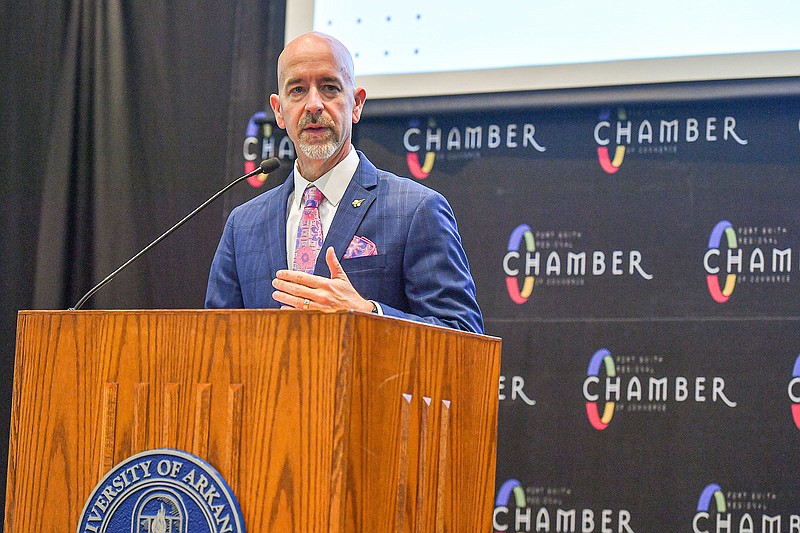LITTLE ROCK -- Arkansas Education Secretary Jacob Oliva and his staff on Thursday set the stage for the work that state and district educators will be doing in the 2023-24 school year that begins Monday for the majority of students.
Speaking to the State Board of Education, Oliva pointed out that math and literacy achievement in Arkansas lags -- sometimes significantly -- behind averages on the National Assessment of Educational Progress, a test given periodically in every state to a representative sample of students.
Similarly, student performance on the Arkansas-required ACT Aspire exams in math, literacy and science last spring floundered, he said, with the percentage of third-graders scoring at desired levels of "ready" and "exceeds ready" levels -- 32.2% -- dropping below last year's 35% and well below the 38.3% that scored at ready or better levels in 2019 before the covid-19 pandemic.
Oliva also noted chronic absenteeism by students and faculty. One in every four kindergartners missed 18 or more days of school in the past year. He also cited a dearth of seventh- and eighth-graders taking algebra I and geometry, and too few students moving toward industry certifications while in middle and early high school. And, he said, nearly half of high school seniors don't take a full class schedule -- and then many have to take remedial courses in college.
"You can see that there is opportunity," Oliva told the Education Board. "When you look at where historically Arkansas ranks on national assessments for the last 20 years, it's not trending in the right direction. We are going to hit 'refresh.' We are going to work with school districts. We're going to get this system aligned."
The LEARNS Act or Act 237 of 2023 -- Gov. Sarah Huckabee Sanders' initiative to revamp public education -- plus new state standards in math and English/language arts approved by the Education Board are meant to aid in that effort, Oliva said.
"That includes the deployment as soon as Monday of some 78 state literacy coaches who have been hired to date to work in schools identified as needing that assistance," Deputy Education Commissioner Stacy Smith told the state Education Board.
The coaches will spend as much as 60% of their time in observation, coaching and direct support to the teacher in a classroom. About 20% of the coaches' time will be in professional training and assisting in data analysis; another 10% on working with a school principal on school reading goals; and the final 10% for the coaches' own personal training and completing reports.
The LEARNS Act authorizes the hiring of 150 such literacy coaches.
There are 189 schools identified as needing that coaching, Smith said. Those schools that aren't covered by a literacy coach will partner with a high-quality professional learning partner, she said.
"There is a protocol to our training. There are templates and forms that everyone is using consistently. There are feedback forms that will be utilized by superintendents, teachers and the coaches. There are lots of parameters being put in place to make sure this is successful."
The districts must have high-quality instructional materials and they must provide teacher training on using those materials, Smith also said.
"That is a huge component. Just buying the box and putting it in the classroom and expecting the teacher to use it without the proper training is not where we need to be," she said.
Properly screening students for their learning needs will be a priority in the coming year.
Districts now use a variety of screening systems, but the state is seeking to procure a screening system that can be used uniformly statewide in kindergarten through third grade, Smith said. The plan is for the state to set a standard pass or "cut" score on that screening system that would result in more testing of struggling students, the development of an individualized reading instruction plan for those students or the use of other interventions.
A state screening system could be piloted as soon as in the spring of 2024.
The individualized reading plans will identify the specific reading skills and remedies that are needed by individual students, Smith continued.
"Writing in a plan 'after-school tutoring' or 'summer school' is not specific," she added.
Additionally, the LEARNS Act authorizes $500 grants to families for tutoring of students who need academic support. State leaders are in the process of vetting organizations that can provide tutoring to students and determining what students will qualify for that benefit, Smith said.
"The rules and procedures are being fleshed out right now," she said.
Education Board member Randy Henderson of Blytheville welcomed the initiatives, saying he "loves the bold moves to increase opportunities" and "the seeds we are planting." He called it a good time to be in Arkansas.

